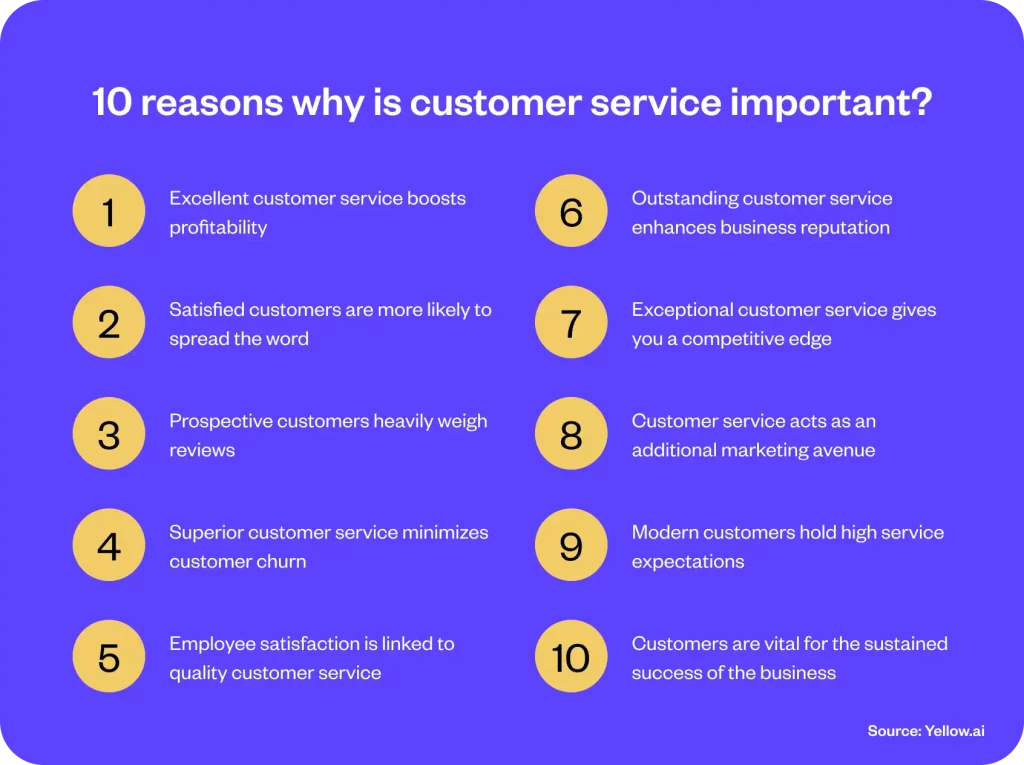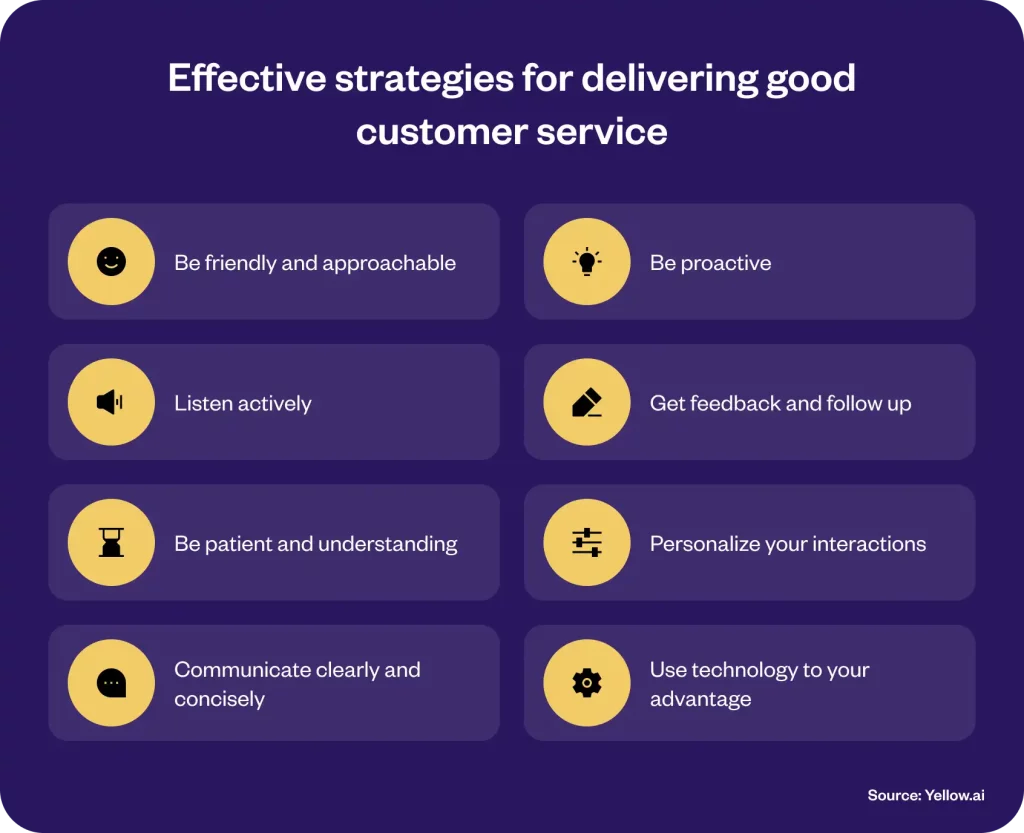Executive summary
“Why is customer service important, why it should be prioritized, and what good customer service entails have become pivotal questions in today’s business landscape?”. Developing and selling the products is only half the battle because the other half battle is providing your customers with good customer service.
To support this, a study by Salesforce reveals a telling statistic: 80% of customers consider the experience provided by a company as important as its products or services. This data isn’t just numbers; it’s a clear indicator of the changing landscape where customer service is no longer a support function, but a core aspect of business strategy.
In this blog, we aim to dive deep into these crucial questions and how by prioritizing customer service, companies can not only enhance customer satisfaction but also foster loyalty and encourage repeat business. So let’s explore the intrinsic value of customer service and how it has become a cornerstone of business success.
What is good customer service?
Good customer service is all about aligning with customer expectations, and it takes various forms. Whether engaging with customers through their preferred messaging channels for added convenience or enriching your knowledge base to empower them to find answers independently, the goal remains the same. It’s about providing a service that’s not just attentive, but also deeply attuned to the unique needs of each customer. This approach ensures that at every stage of their journey with your product or service, from initial inquiry to post-purchase support, you’re not just meeting expectations – you’re exceeding them. Now, let’s dive deeper into how this can be achieved.
Related must-reads:
- Customer service trends to watch in 2024
- 15 Key customer service skills (How to develop them)
- 10 Great customer service experience examples in 2024
- What is customer service automation [+7 benefits]
How can we enhance assistance for potential buyers?
So, you’ve got a customer interested in what you’re selling. How do you take your service to the next level? It’s all about personalization and knowledge. Ensure that your team is well-versed in every aspect of your product or service. This allows them to tailor their advice and recommendations to each customer, making them feel understood and well-guided. Also, consider the power of proactive service: anticipate questions and provide comprehensive information before the customer even asks.
What are effective ways to improve support during the purchasing journey?
The purchasing journey is a critical time to solidify a positive customer experience. Make this process as seamless and supportive as possible. This could mean having an easily navigable website, clear communication about the status of their purchase, or providing extra support channels like live chat or a helpline. Remember, the goal is to make the customer feel supported and confident in their decision at every step.
What strategies work best for post-purchase assistance?
After the sale, your job isn’t done. Post-purchase support can turn a one-time buyer into a loyal customer. Follow up with customers to ensure they’re satisfied with their purchase. Offer resources or tutorials on how to best use the product. Make sure they know how to reach you for further assistance. This ongoing support demonstrates that you value their business beyond just the sale, fostering a lasting relationship.
Related read: Chatbot vs live chat: Which is better for customer service?
10 Reasons why is customer service important?
In the competitive landscape of business, what distinguishes thriving companies is their approach to customer service. It’s a critical element for brands to actively shape their identity and plan their growth path. Grasping the finer details of customer service is crucial in this context. Therefore, let’s delve into 10 reasons why customer service is important.

Empower your customers with a support experience like no other

1. Excellent customer service boosts profitability
Exceptional customer service isn’t just about making customers feel good; it’s a strategic driver for enhancing the bottom line of e-commerce companies. According to insightful data, a remarkable 84% of organizations actively working to improve customer service have reported a subsequent increase in revenue. This underscores the significance of ongoing efforts to elevate customer service standards.
Moreover, the impact on profitability becomes even more evident with the revelation that a modest 5% improvement in customer retention can lead to a substantial 25% increase in profits. The correlation between excellent customer service and financial prosperity is emphasized by the fact that 80% of customers say the experience a company provides is just as necessary as its products or services.
Perhaps most compelling is the consumer sentiment that showcases the monetary value placed on superior customer service. An overwhelming 67% of customers express their willingness to pay more for an enhanced customer service experience. This willingness to invest financially emphasizes the direct correlation between excellent customer service and the overall profitability of a business.
2. Satisfied customers are more likely to spread the word
Customers who are satisfied with their experience not only contribute to a positive reputation but also become valuable advocates for your business. 77% of global respondents say word-of-mouth advice from family and friends is the most persuasive source of new product information. This underlines the enduring influence of personal networks in shaping consumer decisions. Good customer service plays a pivotal role in leveraging this trust, encouraging customers to share their positive experiences with those they know.
In fact, the impact of excellent customer service goes beyond issue resolution; it holds the power to influence a customer’s willingness to recommend your company. After a positive experience, a significant 69% of customers express their likelihood to recommend the company to others within their social circles.
However, the significance of referrals also comes with a cautionary note. Referrals, while powerful in promoting your business, can work adversely if customer service is inadequate. Negative experiences may lead customers to share their dissatisfaction with friends and colleagues, potentially building a negative reputation that can drive away future customers.
3. Prospective customers heavily weigh reviews
In the contemporary landscape, online reviews play a crucial role in shaping the decisions of prospective customers. A staggering 91% of consumers actively read online reviews, emphasizing the increasing significance of this practice. Moreover, a significant 84% of individuals trust these reviews as much as recommendations from people they know. This showcases the pivotal role positive reviews can play in instilling confidence in potential customers.
Creating a stellar customer service experience is identified as a direct pathway to fostering positive reviews. Positive interactions with the support team are likely to find expression in favorable online reviews, contributing to the overall positive image of the brand.
Conversely, the impact of falling short in customer service is substantial. Negative experiences often lead customers to express their dissatisfaction through online reviews. The reach of these negative reviews is noteworthy, as prospective customers are highly likely to come across them. This underscores the importance of robust customer service in mitigating the risk of negative online sentiments.
4. Superior customer service minimizes customer churn
In the realm of e-commerce, mitigating customer churn is a vital objective. The goal is not merely a one-time purchase but establishing a relationship that encourages customers to return repeatedly.
A potent strategy for reducing customer churn is a steadfast commitment to excellent customer service. Astonishingly, 93% of customers are willing to make repeat purchases with companies based on the experience of exceptional customer service. This statistic underscores the profound impact that positive customer interactions can have on fostering loyalty and encouraging repeat business.
Conversely, the repercussions of poor customer service on customer churn are noteworthy. Following a negative customer service experience, a striking 89% of consumers reported opting to do business with a competitor. This sharp decline in loyalty highlights the critical role that customer service plays in retaining customers and preventing them from seeking alternatives.
5. Employee satisfaction is linked to quality customer service
The relationship between employee satisfaction and quality customer service is fundamental to overall business success, with notable implications for productivity and growth.
Research from Gallup demonstrates a direct link, revealing that highly engaged employees achieve a significant 10% increase in customer ratings. This correlation emphasizes the interconnectedness of internal and external satisfaction, prompting the question: which comes first, happy employees or happy customers? The answer lies in their mutual reinforcement, showcasing the importance of fostering happiness across all business levels.
Despite these insights, Hubspot’s 2022 State of Customer Service report indicates that nearly 40% of customer service leaders view customer service as an expense rather than a driver for growth. Companies have the opportunity to support their customer service teams with resources, technology, and respect. When equipped to excel in their roles, customer service staff become more comfortable and motivated, creating a positive impact not only on their own satisfaction but also on the overall happiness of customers.
6. Outstanding customer service enhances business reputation
The impact of outstanding customer service extends beyond individual interactions, significantly influencing a company’s reputation and brand growth.
Consumers actively consider customer service in their purchasing decisions, with a substantial 78% using it as a key factor when deciding whether or not to do business with a company. This underscores the critical role that a company’s reputation for customer service plays in shaping the preferences of potential customers. Importantly, customer service isn’t confined to frontline representatives; the experiences potential customers have during the sales process also impact their purchasing decisions. As a result, delivering positive customer service experiences becomes a paramount goal for any customer-facing role.
Cultivating a strong culture and reputation is a strategic imperative for any brand. This involves defining the values that employees should embrace, differentiating the brand from competitors, and utilizing visual branding to reflect the defined culture. Additionally, showcasing the brand on social media platforms and demonstrating good customer service contribute to building a positive reputation. Notably, a staggering 55% of consumers become customers because of a brand’s reputation for great customer service.
7. Exceptional customer service gives you a competitive edge
In the fiercely competitive e-commerce landscape, standing out is essential for success. A reputable product is crucial, but exceptional customer service serves as a key differentiator. Dating back to 1995, research highlighted the strategic advantage of treating customers better than the competition. It goes beyond niceties on the phone, extending to crafting policies that ensure customers feel cared for throughout the buying process.
Regardless of the industry, every business aspires to be the best. Customer service plays a pivotal role in achieving this distinction. Churn, where customers cease business due to poor experiences, is a prevalent challenge. Addressing the issue during the first interaction can prevent a significant 67% of churn. This not only retains existing customers but also positions the company to acquire dissatisfied customers from competitors. A positive, well-trained customer service team has the power to revolutionize a company, fostering growth and customer loyalty.
Good customer service is a valuable selling point for any business. When faced with similar products, consumers are likely to choose the company with superior customer service. Effective customer service strategies not only build lasting relationships but also offer a competitive advantage over other businesses.
8. Customer service acts as an additional marketing avenue
Exceptional customer service goes beyond issue resolution; it delights customers, leaving them truly happy and impressed. This satisfaction often translates into positive experiences shared on social media platforms. Notably, 72% of customers will share their good experiences with others. When customers are impressed by a company’s service, they willingly become advocates, amplifying their positive experiences across social channels.
Positive word-of-mouth marketing emerges as a potent form of advertising. Satisfied customers share their positive experiences with friends and family, contributing to improved sales and profits and also cultivating a win-win situation for all involved. It’s a cost-effective strategy for companies, bringing in new customers while making existing customers feel good about recommending the product or service.
The impact of word-of-mouth marketing is far-reaching. When someone shares their positive experience, it has the potential to influence multiple others, creating a ripple effect of recommendations. This organic and genuine form of advertising is not only free for the company but also fosters a positive community around the brand.
9. Modern customers hold high service expectations
The advent of the internet has revolutionized customer service, offering support across diverse channels 24/7. In this digital era, customer expectations have reached unprecedented heights. Currently, 72% of consumers anticipate businesses to comprehend their needs and treat them as unique individuals. Additionally, a substantial 66% of customers would switch to a competitor if they felt treated as a mere number rather than an individual.
The call for outstanding customer service has intensified, with over half of surveyed individuals (58%) expressing heightened expectations post-COVID-19. Customers not only expect businesses to have a customer service team but demand it to be top-notch and responsive.
In meeting these elevated expectations, businesses face the challenge of delivering a consistent experience across channels. Despite 71% of customers desiring consistency across all channels, only 29% believe they currently receive it. Empowered with alternatives, modern customers readily explore other options if dissatisfied. Brands must step up, exceeding customer expectations to secure and cultivate a loyal customer base.
10. Customers are vital for the sustained success of the business
Customer service is fundamentally about providing support to the lifeblood of any business—its customers. They are the essence of a brand; without them, there would be no brand at all. In the dynamic landscape of a competitive marketplace, prioritizing customer service becomes imperative for the sustained health of a business. Much like the regular practice of walking contributes to overall well-being, tending to customers today becomes an investment that yields dividends as the brand matures.
Additionally, excellent customer service serves as a facilitator for seamless business interactions. Positive customer experiences not only cultivate loyalty but also increase the likelihood of customers returning for future transactions. This positive interaction further simplifies the process of recommending the company to friends and family. The bedrock of people’s buying decisions lies in positive customer experiences, fostering trust and loyalty—integral components for the enduring success of any company.
Effective strategies for delivering good customer service
Embarking on the path to exceptional customer service involves embodying key principles that resonate with friendliness, active listening, and unwavering patience. This section delves into actionable strategies to transform your customer interactions. From fostering an approachable demeanor to harnessing the power of technology, these tips are the building blocks for creating memorable customer experiences. Let’s explore how incorporating friendliness, proactive communication, and personalized interactions can elevate your customer service game to new heights.

1. Be friendly and approachable
Creating a positive customer service experience begins with a friendly and approachable demeanor. When customers feel welcomed and valued, it sets the tone for constructive interaction. Approach each interaction with a genuine smile, whether in person or through digital channels. Infuse warmth into your communication, making customers feel at ease and confident that their concerns are in capable and friendly hands. This foundational element lays the groundwork for building trust and fostering lasting relationships with your customers.
2. Listen actively
Active listening is a cornerstone of effective customer service. Pay close attention to what your customers are expressing, not just in words but also in the emotions behind their messages. Encourage them to share their thoughts and concerns openly, and then demonstrate your engagement by paraphrasing or summarizing their points. This not only ensures a clear understanding of their needs but also communicates genuine interest. Active listening establishes a connection, showing customers that their voices are heard and valued, setting the stage for meaningful and empathetic resolutions.
3. Be patient and understanding
Patience and understanding form the bedrock of exemplary customer service. Recognize that customers may face challenges, and their emotions may run high. Approach each situation with a calm demeanor, allowing space for customers to express themselves fully. Practice empathy by putting yourself in their shoes, understanding their perspectives, and demonstrating a willingness to assist. By fostering a patient and understanding approach, you not only defuse tension but also create an environment where customers feel supported and valued throughout the resolution process.
4. Communicate clearly and concisely
In customer service, effective communication stands as a linchpin for success. Strive for clarity and conciseness in your interactions. Utilize straightforward language, steering clear of unnecessary complexity. Articulate information, instructions, and solutions to ensure customers easily grasp the content. Concise communication not only enhances understanding but also showcases professionalism, contributing to positive and efficient customer interactions.
5. Be proactive
Proactive customer service involves anticipating customer needs and addressing them before they become issues. Take initiative by providing relevant information, tips, or solutions that customers might find helpful. Be proactive in offering assistance, whether through personalized recommendations or pre-emptive solutions to potential problems. By staying one step ahead, you not only showcase your commitment to customer satisfaction but also create a positive experience that goes beyond reactive problem-solving.
6. Get feedback and follow up
Continuous improvement is at the heart of exceptional customer service. Actively seek feedback to understand experiences and expectations. Whether through surveys, reviews, or direct communication, gather insights that contribute to refining your service. Additionally, follow up with customers after resolving an issue or completing a transaction, demonstrating your commitment to their satisfaction and addressing any lingering concerns. Incorporating feedback and maintaining open lines of communication creates a customer-centric approach fostering loyalty and trust.
7. Personalize your interactions
In the realm of customer service, one size does not fit all. Tailor your interactions to individual preferences and needs, making customers feel valued and understood. Utilize customer data to personalize communication, addressing them by name and referencing their previous interactions. Anticipate their preferences and offer personalized recommendations. This not only enhances the customer experience but also cultivates a sense of connection and loyalty. Personalizing interactions demonstrates that your service is not just transactional but is grounded in a genuine understanding of each customer’s unique journey.
8. Use technology to your advantage
Leveraging technology is crucial for providing efficient and effective customer service. Incorporate chatbots to handle routine queries promptly, offering instant support. Implement self-service portals that empower customers to find information and solutions independently. Utilize Customer Relationship Management (CRM) systems to track customer interactions, preferences, and history, ensuring a personalized and seamless experience. By embracing technology strategically, you not only streamline processes but also enhance the overall customer journey.
How Yellow.ai can help you enhance your customer service
In today’s competitive environment, superior customer service is crucial for business success. Yellow.ai empowers organizations to revolutionize their customer service with advanced AI-driven solutions. Here’s how our platform can transform your customer service offerings:
1. AI-powered chatbots and voice agents: Yellow.ai provides sophisticated AI chatbots and voice agents that deliver responsive, 24/7 customer service across multiple communication channels. These agents handle a broad spectrum of customer interactions, ensuring consistent and efficient service anytime, anywhere.
2. Self-service capabilities: Our platform enriches customer service by integrating robust self-service options that allow customers to resolve many of their issues independently. This not only enhances customer satisfaction by providing immediate solutions but also reduces the demand on your service agents.


3. AI copilots for service agents: Yellow.ai’s AI copilots support your customer service teams by supplying real-time assistance, including suggestions for responses and actions. This tool helps agents resolve issues more effectively, ensuring a higher quality of service and increasing customer satisfaction.
4. Personalized customer interactions: Leveraging AI to analyze customer data, Yellow.ai tailors interactions to individual preferences and histories. Personalization makes customers feel valued and improves their overall service experience, fostering loyalty.
5. Omnichannel Support: With Yellow.ai, ensure that your customer service is seamless across all channels. Our omnichannel capabilities maintain context and history across interactions, whether they occur on social media, email, chat, or voice, providing a cohesive customer experience.
6. Proactive engagement: Utilizing advanced analytics and sentiment analysis, Yellow.ai enables your service team to proactively address customer needs and concerns before they escalate. This proactive approach not only improves customer satisfaction but also helps in building stronger customer relationships.
7. Enhanced security features: At Yellow.ai, we prioritize the security of your customer interactions. Our platform adheres to the highest security standards, ensuring that all customer data is handled with the utmost care and protection.
8. Comprehensive analytics: Gain deep insights into customer preferences, service effectiveness, and areas for improvement with Yellow.ai’s advanced analytics. These insights enable continuous improvement and refinement of your customer service strategies.
Integrating Yellow.ai into your customer service operations isn’t just about automating tasks—it’s about fundamentally enhancing the way you interact with and serve your customers. By deploying our cutting-edge technology, you can ensure that your business not only meets but exceeds customer expectations, setting a new standard for service excellence.
As you’ve gained insights into the capabilities of Yellow.ai’s chatbots, let’s delve into real-world examples through case studies. Discover how businesses have harnessed the power of Generative AI chatbots to enhance their customer experience and elevate operational efficiency.
Success stories

Lion Parcel elevates customer service
Lion Parcel elevates customer service with 85% automation powered by Generative AI

Hyundai boosts revenue and improves customer service with AI automation
Explore how Yellow.ai’s automation led to ~1000 car sales, a 10% retail conversion rate, and over 1.4 million user impressions

Pelago reimagines customer experience with generative AI powered conversational AI agents
Within a mere six weeks of going live, Pelago not only onboarded over 5,000 users but also achieved a striking 50% deflection rate!
Conclusion
Understanding why is customer service important is pivotal in today’s competitive business landscape. It’s the cornerstone that supports not only customer satisfaction and loyalty but also plays a crucial role in a company’s profitability and reputation. Exceptional customer service is a dynamic, evolving practice, where businesses must consistently listen, empathize, and respond to their customers’ needs. This ongoing commitment to excellence in customer service distinguishes successful businesses from the rest.
The integration of advanced tools like Yellow.ai’s chatbots can significantly enhance customer service efficiency and effectiveness and as we embrace the future, leveraging such cutting-edge technology becomes essential in maintaining and elevating the standard of customer service excellence.
Transform your customer service today with Yellow.ai

Frequently asked questions (FAQs)
What are the metrics used in customer service?
The top customer service metrics you should measure are:
- Customer Satisfaction (CSAT)
- Customer Effort Score (CES)
- Net Promoter Score (NPS)
- Social media metrics
- Customer churn
- First response time
- Overall resolution rate
- First contact resolution rate
- Customer ticket request volume
- Average ticket handling time
What are the SLA metrics for customer support?
SLA metrics are internal metrics used by customer support teams to set targets for the proportion of customers who will receive a predefined minimum level of service.
What is a CSAT score?
CSAT is short for Customer Satisfaction, which is a commonly-used key performance indicator used to track how satisfied customers are with your organisation’s products and/or services.
How to measure customer satisfaction?
Important 6 Techniques of Measuring Customer Satisfaction:
- Customer Feedback Through Surveys.
- Customer Satisfaction Score.
- Net Promoter Score.
- Customer Effort Score.
- Web-Analytics.
- Social Media Metrics.
What metric to track customer satisfaction?
Some of the most commonly used satisfaction metrics include Net Promoter Score (NPS), Customer Satisfaction Score (CSAT), Customer Effort Score (CES), Churn Rate, and Customer Lifetime Value (CLV).

















